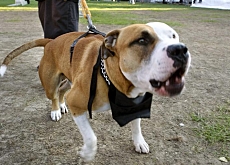Government decides against dangerous dog ban

Dangerous dogs will not be forbidden in Switzerland nor required to have authorisation, the government decided on Wednesday.
But the cabinet is to introduce modified legislation next month making it obligatory for injuries caused by such dogs to be reported to cantonal authorities.
The issue has been a political hot potato in Switzerland since last December when three pit bulls killed a six-year-old boy in Oberglatt near Zurich.
While there were calls for a national law on dangerous dogs, other voices said the issue was the responsibility of the cantons.
The cabinet last month felt the law on animal protection was not a sufficient legal basis for a ban on certain dogs, including pit bulls. The mass-circulation tabloid Blick newspaper of Zurich had led a campaign to introduce such legislation.
Economics minister Joseph Deiss, who is responsible in the matter, called for reports on dogs that “seriously injured humans or animals” or which “showed signs of aggressive behaviour above the norm”.
Doctors, vets, customs officials and dog trainers will have to report such incidents to the competent cantonal authorities.
These will then decide on measures ranging from obligatory courses for dog owners to putting the dog to sleep.
Responsible owners
The government measures also aim at making “dog owners responsible and ensuring a good social behaviour of the dog”.
The modified law stipulates that the breeding and selection of dogs should be done in such a way as to encourage animals that are less aggressive.
It states that the holder must take preventive measures for the dog to remain inoffensive. But there is no obligation for dogs to wear muzzles.
The law also widens the system of identification, with a change of dog ownership having to be reported to the authorities.
The government has asked the Swiss justice and police ministry to examine the question of strengthening the civil responsibility of dog owners, for example by introducing an obligatory third-party insurance for all dogs or for certain breeds.
Put in his place by some of his fellow cabinet colleagues for wanting to be firmer on the issue, Deiss on Wednesday hinted at his unhappiness at their reaction.
“I do not hide from you that I presented other measures that were not accepted by the government,” he commented.
Mountain and mouse
Kathrin Ricklin, president of the parliamentary commission that had come out of favour of a pit bull ban was also disappointed, commenting that “the mountain has given birth to a mouse”.
“Owners of pit bulls are often social outsiders. It will be difficult to speak to them about responsibility,” she said.
Parliament has not had its final say because the commission will discuss on April 28 an initiative that is in favour of a ban on dangerous dogs.
The Swiss Veterinarians’ Association applauded the government move. Its president, Charles Troillet, said it was wrong to make a distinction between dangerous dogs and others.
He said it gave the impression that those dogs which were not on a danger list were never dangerous, which was not the case.
The Swiss Canine Society was also positive, commenting that a ban on some breeds would have been “a superficial decision”. But its spokeswoman, Verena Amman, said she felt it was justified “to treat case by case”.
The Animal Protection Foundation also expressed satisfaction, adding that it was now up to the cantons to apply the measures as soon as possible.
swissinfo with agencies
According to a Federal Veterinary Office report dating from 2002, about 13,000 people are bitten by dogs annually in Switzerland.
In 24% of cases, the victim is bitten by his own dog, in 34% the dog is known to the person bitten, and in 42% of incidents the dog is unknown to the victim.
Before the young boy’s death in Oberglatt, the only fatality blamed on a dog dates back to November 2000 in Zurich. A woman who had been frightened by a dog jumped into the River Limmat and drowned.
Dangerous dogs came under the spotlight after the death of a young boy bitten by pit bulls last December in canton Zurich.
Parliament called on the government to strengthen federal legislation. The Zurich tabloid Blick, which launched a petition to ban pit bulls, collected more than 175,000 signatures.
Some cantons decided themselves to tighten their dog laws.
At the federal level, the law on the protection of animals is making it compulsory from next year for all dogs to have a tattoo or microchip.
Swiss legislation on dogs is among the least restrictive in Europe. Certain breeds are totally banned in France and Germany.

In compliance with the JTI standards
More: SWI swissinfo.ch certified by the Journalism Trust Initiative











You can find an overview of ongoing debates with our journalists here . Please join us!
If you want to start a conversation about a topic raised in this article or want to report factual errors, email us at english@swissinfo.ch.